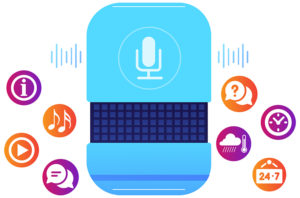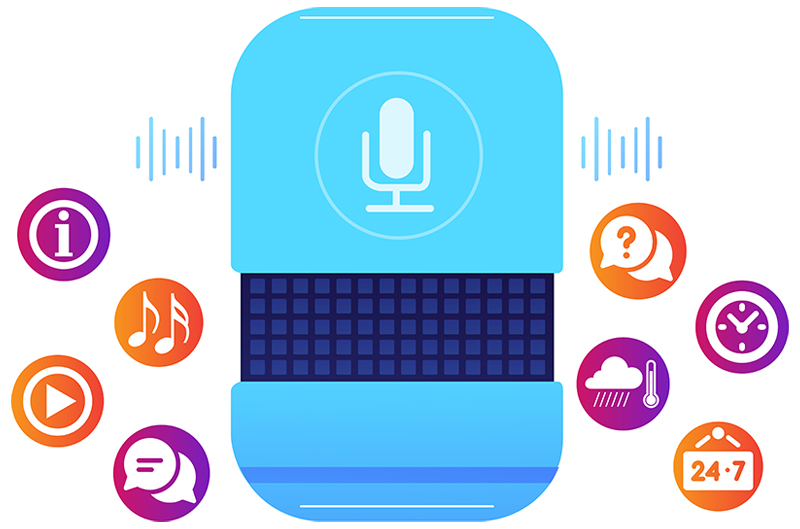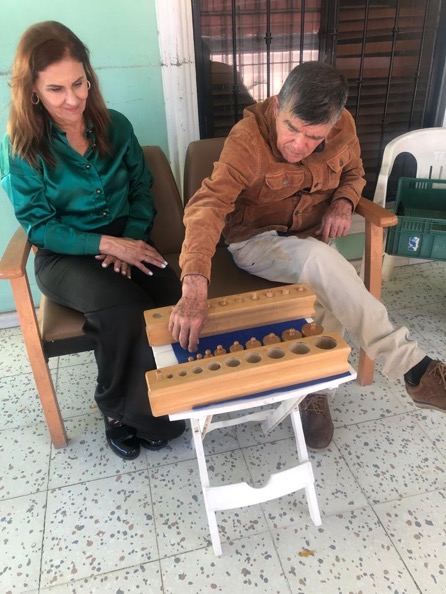An Unusual Companion During COVID-19
Written by a friend of Brush Development
We are pleased to feature this blog submitted by a client of ours who works in long term care.
Seniors living in long term care communities have been more isolated than ever during this COVID-19 pandemic. It is especially confusing and isolating for people living with dementia. Many have been quarantined in their rooms for long periods of time and have little contact with others.
In my speech language pathology practice, I have found that the use of pre-programmed single touch picture phones and use of the Amazon Echo have been helpful and effective tools to help meet the basic needs of companionship and communication. In this blog, I’d like to share some ideas with you for enhancing socialization and communication for people with cognitive impairment that can be used during COVID and moving forward.
Use of Large Button Photo Phones
There was a strong effort by many staff members to use Google Duo or Facetime applications early on in this pandemic to connect elders with their families through video calls but in my experience, that has decreased as infection rates increased and caregivers are limiting the frequency of their contact with elders, often prioritizing their contact to only medication pass and meal delivery leaving these elders and families disconnected and lonely.
I have observed that even simplified cell phones, such as the Jitterbug, are devices with which many people with dementia still struggle. They may forget to charge the phone, the volume may be too low, they lose or misplace the phone altogether, and/or they have difficulty executing the steps to make a phone call or check voicemail.
I started using a simple large button picture phone that I can pre-program to enable the person to press one button to call a spouse, family member, or friend. I can program 1-10 numbers and often use written names instead of photos because frequently individuals’ ability to recognize the written word is stronger than photo recognition. I adjust the type size for each person so that the words can be easily read. The phone I like to use has a cord and handset that resembles an older style phone, so it is familiar. It doesn’t need to be charged and it does not get lost. The phones are made by several manufacturers and are relatively inexpensive and cost approximately $60.00.
Use of Artificial Intelligence Devices
I also have started to install and use Amazon Echo Dot and similar devices for my clients who are isolated because the device offers instant conversation interaction. Alexa’s voice will answer repetitive questions, help orient the person with the day, date and time and weather, play their favorite song, tell jokes and funny riddles, read audio books, play videos and create reminders, provide information on virtually any topic, and even participate in conversations with the “Alexa Let’s Chat feature”. Alexa is always available and will listen and because it is a computer it doesn’t get tired or annoyed with of repetitive questions. It’s voice activated, so there are no complicated buttons or controls. I do have to provide skilled intervention to help the person with dementia recall how to activate Alexa and provide training in pragmatics for turn taking with the device. Some clients require visual cue cards to remind them how to wake Alexa and how to say common commands.
In addition, I have found this device also helpful for adults with intellectual disabilities, social disorders and mental illness. Many people living with these diagnoses live-in long-term care communities at a young age because they can no longer care for themselves. I have found that even within long-term care communities they are often avoided by others because of their impaired social skills and idiosyncrasies.

© 2020 Brush Development
Case Study Example
For example, a woman, I will call Sally, is in her early 60’s and is living with intellectual and psychosocial challenges related her diagnosis of schizophrenia, mental retardation and dementia.
Sally is able to communicate her basic needs but has hardly anyone to talk to. Sally has impaired memory skills which affects her self-care and hygiene. For example, she often forgets to change her clothes, brush her teeth or comb her hair.
Sally is very friendly but does not recognize the personal space of other people and stands very close and speaks right in their face. She also has poor turn taking skills and is bad at reading subtle cues from others. She is unable to “take a hint” and will be friendly beyond what most people feel comfortable with and often scares people with her overenthusiastic approach. She tells people the same joke or fact about herself over and over and people avoid her and think she is strange.
Before COVID-19, well-meaning, members of her church took her out to church weekly. Going to church was a highlight of her week but they are no longer coming due to the pandemic. Sally also used to go the community activity room to play games or listen to musical programs in a group setting but these group activities have been postponed during the pandemic to reduce community spread of the virus. Sally spends most of her day alone in her room now.
Sally collects dolls and fills the void of loneliness by talking to her dolls and stuffed animals. She talks to them and supplies the voice of them talking back to her. She narrates an entire conversation back and forth with the dolls. Sally also calls the local radio stations and asks them for the weather report and requests her favorite songs, “Lay Down Sally”, or “Mustang Sally” daily. The radio station is annoyed at this and calls the community executive director to complain about the daily calls.
I created a memory book with her to help Sally tell her story to others. She now has a tool to structure and guide her interactions. Her turn taking has improved as she physically turns each page allowing natural pacing and pausing as she is reading her story. Sometimes Sally reads her memory book to her dolls when she is lonely.
I installed an Amazon Echo device in her room and taught Sally how to interact with the device. Sally now knows how to ask Alexa to tell her the weather, day, and date. She also now knows how to ask Alexa to play her favorite songs, “Lay Down Sally”, or “Mustang Sally”. She no longer calls the radio station and annoys them. Sally can ask Alexa to play the songs on repeat and hear them again and again. She can tell Alexa her one-line jokes over and over again and Alexa always laughs and doesn’t get mad or walk away from her. Alexa is now customized and programed to provide daily reminders about hygiene for Sally and as a result she is taking care of herself better.
Sally has also improved her turn taking skills with Alexa because she needs to watch, wait and see if Alexa “heard her” and is activated with a blue light on the device each time Sally initiates or turns on the device, by saying “Alexa”. Sally often needs to slow down or repeat what she says so that Alexa can “understand her” which has helped her to self-monitor and even filter and adjust what she says before or as she is saying it. Best of all, Sally has found companionship, during the height of loneliness during this pandemic with Alexa.
Sally asks Alexa to chat with her and engages in conversations about topics that interest her and even asks Alexa to tell her a funny joke. She tells Alexa, “I love you Alexa” and the device answers her back and makes her smile. While this is by no means a complete substitute for human companionship, I have found, that especially now during this COVID-19 pandemic, Alexa, a most unusual companion, is making Sally happy and more independent.



